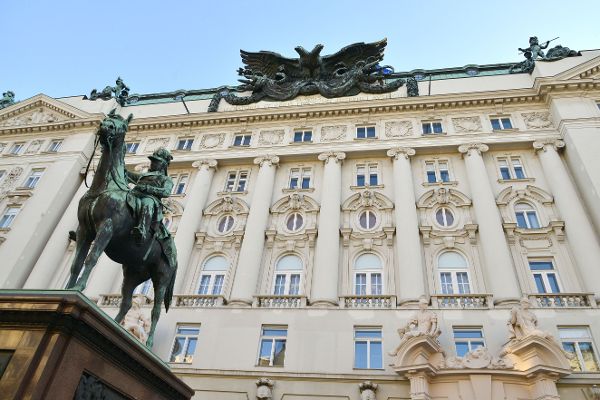History of the Ministry

Since its establishment in 1918, the ministry has been working to strengthen rural areas. After all, this is where two thirds of the Austrian people live. At the time of the monarchy, as much as three quarters of the Austrian population were farmers. Stable circumstances for agriculture have been a core issue then, and they still are now.
Establishment of the Ministry
Special concerns of agricultural policy were to improve animal breeding and forestry and to enhance the quality of life in rural areas. Even today strengthening rural areas as a backbone of society is still a fundamental objective of the Ministry. This includes efforts to increase the competitiveness of agriculture and the sale of its products on national and international markets. These issues were important at the time of the monarchy - and they have not lost any of their relevance.
When the Imperial and Royal Ministry of Agriculture was established in 1868, one of the crucial reasons for doing so was that agriculture needed a new form of administration. Since that time Austria has had a central institution managing the affairs of agriculture, forestry and water management on government level which ensures a future-oriented, environmentally sound agricultural policy in the Austrian and in the European framework.
💡 Tip
The establishment of the ministry of agriculture and its first years of existence were an eventful time. Find out more in the article "Establishment of the Ministry of Agriculture".
New agricultural system due to EU accession
Austria’s accession to the European Union in 1995 required an adaptation to a completely new agricultural system. Stable economic and ecological framework conditions were, and still are, indispensable for the development of Austria’s agriculture and forestry. As it used to be 130 years ago, ensuring them is the primary task of the Ministry. This is the only way of offering people in rural areas framework conditions which allow them to live, work and do business there - and thus also a basis which allows them to fulfil their multiple functions in society also in the future.
Development of the ministry
Between 2000 and 2020, the environment sector was part of the ministry as well: competences for soil, water, air and intact nature were all exercised at the Federal Ministry of Agriculture, Forestry, Environment and Water Management.
In 2018, the competences of the Ministry were extended to include also tourism, energy and mining affairs. The principle of sustainability combines all of these thematic areas - to illustrate that, the BMLFUW (Federal Ministry of Agriculture, Forestry, Environment and Water Management) was officially renamed “Federal Ministry for Sustainability and Tourism” (BMNT).
With the entry into force of the amendment to the ("Bundesministeriengesetz") on January 29, 2020, the previous "Federal Ministry for Sustainability and Tourism" became the "Federal Ministry of Agriculture, Regions and Tourism (BMLRT)". The responsibilities of the new BMLRT thus expanded to include the broadband, postal service and telecommunications agendas as well as responsibility for civilian service.
Due to a government reshuffle in June 2022 the Federal Ministry of Agriculture, Regions and Tourism (BMLRT) has turned, with the entry into force of the Federal Ministries Act at the beginning of July - according to the fields of competence - into the Federal Ministry of Agriculture, Regions and Water Management, briefly BML. The issues concerning tourism have been transferred to the Federal Ministry of Labour and Economy. The fields of telecommunications and mail have been integrated into the Ministry of Finance, and matters concerning civilian service have been added to the fields of responsibility of the Federal Chancellery.
Overview of the history of the ministry and all ministers
Federal Ministry of Agriculture and Forestry (December 20, 1945–March 31, 2000)
- Federal Minister Josef Kraus (20.12.1945–23. 1.1952)
- Federal Minister Franz Thoma (23.1.1952–16.7.1959)
- Federal Minister Eduard Hartmann (16.7.1959–2.4.1964)
- Federal Minister Karl Schleinzer (2.4.1964–21.4.1970)
- Federal Minister Johann Öllinger (21.4.1970–22.5.1970)
- Federal Minister Oskar Weihs (22.5.1970–30.9.1976)
- Federal Minister Günter Haiden (1.10.1976–16.6.1986)
- Federal Minister Erich Schmidt (16.6.1986–21.1.1987)
- Federal Minister Josef Riegler (21.1.1987–24.4.1989)
- Federal Minister Franz Fischler (24.4.1989–17.11.1994)
- Federal Minister Jürgen Weiss (17.11.1994–29.11.1994)
- Federal Minister Wilhelm Molterer (29.11.1994–31.3.2000)
Federal Ministry of Agriculture and Forestry, Environment and Water Management (1.4.2000–8.1.2018)
Responsibility: Agriculture and forestry, water management, environment, waste management, chemical policy
- Federal Minister Wilhelm Molterer (1.4.2000–28.2.2003)
- Federal Minister Josef Pröll (28.2.2003–2.12.2008)
- Federal Minister Nikolaus Berlakovich (2.12.2008–16.12.2013)
- Federal Minister Andrä Rupprechter (16.12.2013–18.12.2017)
- Federal Minister Elisabeth Köstinger (18.12. 017–8.1.2018)
Federal Ministry for Sustainability and Tourism (8.1.2018–28.1.2020)
Responsibility: Agriculture and forestry, water management, environment, energy, mining, tourism
- Federal Minister Elisabeth Köstinger (8.1.2018–3.6.2019)
- Federal Minister Maria Patek (3.6.2019–7.1.2020)
- Federal Minister Elisabeth Köstinger (7.1.2020–28.1.2020)
Federal Ministry of Agriculture, Regions and Tourism (29.1.2020–17.7.2022)
Responsibility: Agriculture and forestry, water management, mining, telecommunications and postal services, tourism, community service
- Federal Minister Elisabeth Köstinger (29.1.2020–18.5.2022)
- Federal Minister Norbert Totschnig (18.5.2022–17.7.2022)
Federal Ministry of Agriculture and Forestry, Regions and Water Management (18.7.2022 until ongoing)
Responsibility: Agriculture and forestry, water management, regional policy
- Federal Minister Norbert Totschnig (18.7.2022 bis laufend)
